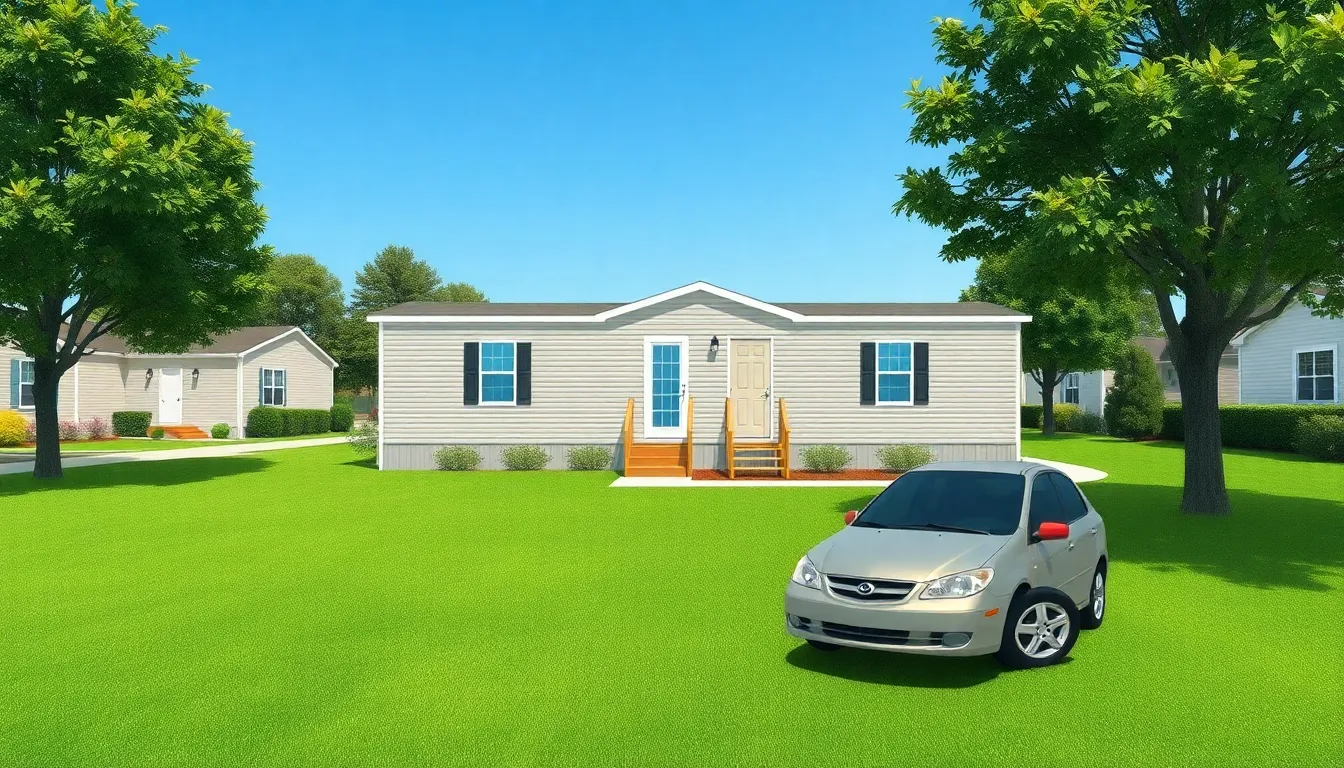Mobile homes offer a unique blend of freedom and comfort, but they also come with their own set of challenges. Just like a cat in a room full of rocking chairs, navigating the world of homeowners insurance can feel a bit wobbly. With the right coverage, homeowners can protect their cozy abode from unexpected mishaps, whether it’s a rogue raccoon or a surprise hailstorm.
Understanding homeowners insurance for mobile homes is crucial for safeguarding your investment. It’s not just about having a roof over your head; it’s about ensuring that roof stays intact through thick and thin. So, let’s dive into the essentials of mobile home insurance and discover how to keep your slice of paradise safe and sound, all while keeping your sense of humor intact. After all, who wouldn’t want to laugh in the face of a leaky roof?
Table of Contents
ToggleUnderstanding Homeowners Insurance on Mobile Homes
Homeowners insurance for mobile homes offers crucial protection against various risks. Understanding this unique coverage can help residents safeguard their investments.
What Is Homeowners Insurance?
Homeowners insurance provides financial protection for residential property, including mobile homes. Policies typically cover damages to the home structure, personal belongings, and liability for injuries on the property. Coverage often extends to events like fire, theft, and vandalism. Many insurers offer various policy options tailored to mobile homeowners, allowing them to choose coverage levels that suit their needs. These policies differ significantly from traditional homeowners insurance, reflecting the specific risks associated with mobile living.
Specifics of Mobile Home Insurance
Mobile home insurance includes specific provisions addressing unique risks. Standard coverage often encompasses the structure itself, personal property, and additional living expenses if the home becomes uninhabitable. Riders can enhance coverage for specific occurrences, such as flood or earthquake risks. Mobile homeowners should consider liability protection for incidents involving guests or visitors. Premiums typically vary based on factors like location, home age, and coverage amount, making it essential to shop around for the best options.
Coverage Options for Mobile Homeowners Insurance

Coverage for mobile homeowners insurance includes several key areas tailored to meet specific needs. Understanding these options helps homeowners choose the right protection for their investments.
Structure Coverage
Structure coverage protects the mobile home itself from various risks. This includes damage from fire, storms, theft, and vandalism. Policies often cover the home’s roofing, siding, and attached structures like decks or porches. In some cases, coverage extends to repair expenses after natural disasters. Homeowners must verify specific terms and conditions to ensure adequate protection for their investment.
Personal Property Coverage
Personal property coverage safeguards belongings inside the mobile home. This category includes furniture, electronics, appliances, and clothing, providing financial support if items are damaged or stolen. Homeowners can opt for an actual cash value policy, which considers depreciation, or a replacement cost policy, which covers full replacement without depreciation. Assessing personal property value is essential for selecting appropriate limits.
Liability Coverage
Liability coverage protects homeowners against claims resulting from injuries or damages occurring on their property. This can include accidents involving guests or damage to someone else’s property. The coverage typically pays for legal expenses and compensation amounts up to policy limits. Homeowners should examine coverage limits to ensure they align with potential risks associated with their property location and lifestyle.
Factors Affecting Insurance Costs
Insurance costs for mobile homes depend on several critical factors. Understanding these aspects helps homeowners secure adequate coverage.
Location of the Mobile Home
Location significantly influences insurance premiums. Homes in flood-prone areas or regions with high crime rates often incur higher costs. Proximity to emergency services such as fire departments directly impacts risk assessments. Urban settings typically see increased rates due to higher population densities and associated risks. Homeowners should consider these geographical elements when calculating potential insurance expenses.
Age and Condition of the Mobile Home
Age and condition play pivotal roles in determining insurance costs. Older mobile homes may require more maintenance and are generally more susceptible to damage. Insurers typically view them as higher risks, leading to elevated premiums. Well-maintained homes often receive better rates than those in disrepair. Regular inspections and updates can help mitigate costs while ensuring comprehensive coverage.
Coverage Limits and Deductibles
Coverage limits and deductibles directly affect premium pricing. Higher coverage limits lead to increased premiums since they provide broader protection. Lower deductibles can also elevate costs as they represent a lesser financial risk to the insurer. Homeowners often decide on a balance between premium affordability and adequate protection. Selecting appropriate coverage ensures that policies align with individual needs and financial situations.
Tips for Choosing the Right Policy
Choosing the right homeowners insurance for mobile homes requires careful consideration. Understanding individual needs plays a crucial role in finding suitable coverage.
Assessing Your Insurance Needs
Assess specific risks associated with mobile home living. Evaluate potential hazards, including severe weather or wildlife encounters, which might affect coverage. Determine the value of personal property to ascertain necessary protection levels. Consider the age and condition of the mobile home, as these factors influence coverage options. Conduct a risk assessment to ensure adequate liability protection against injury claims on the property. Prioritize needs and align them with available insurance types for optimal coverage.
Comparing Different Insurance Providers
Research multiple insurance providers to find the best fit. Examine coverage options, focusing on the differences from traditional homeowners policies. Request quotes to evaluate premium costs and potential discounts. Read customer reviews for insight into service quality and claims processes. Look for providers with a reputation for reliability and support. Assess the extent of coverage and riders offered to enhance protection against specific risks. Weigh the benefits against costs to make an informed decision that aligns with personal and financial goals.
Homeowners insurance for mobile homes is essential for protecting investments against unique risks. By understanding the specific coverage options available and evaluating individual needs, mobile homeowners can secure the right policy.
It’s crucial to consider factors like location and home condition when shopping for insurance. This ensures that coverage aligns with personal circumstances while also being financially feasible.
With the right insurance in place, mobile homeowners can enjoy their lifestyle with confidence, knowing they’re prepared for the unexpected.



